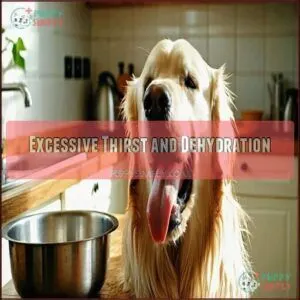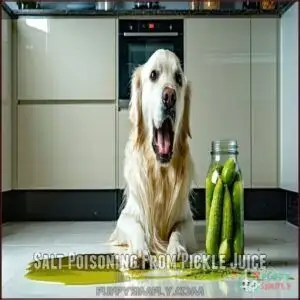This site is supported by our readers. We may earn a commission, at no cost to you, if you purchase through links.
 Wondering if you can share your pickle snack with your furry friend? Think twice!
Wondering if you can share your pickle snack with your furry friend? Think twice!
While dogs can technically eat pickles, they’re not a healthy treat. The high sodium content can cause serious health issues like dehydration and salt poisoning.
Certain pickle varieties with garlic or onions are toxic to dogs. Most vets recommend avoiding pickles altogether.
If your pup accidentally munches on a pickle, watch for symptoms like excessive thirst, vomiting, or lethargy.
Instead, opt for safer alternatives like plain cucumbers or dog-friendly vegetables. Your four-legged companion’s health is worth more than a salty experiment – stick to dog-approved snacks and keep those pickles to yourself, as their health is a critical concern and deserves only the best, healthy care.
Table Of Contents
- Key Takeaways
- Can Dogs Eat Pickles Safely
- Are Pickles Bad for Dogs
- What Are Pickles Made Of
- Dangers of Pickle Consumption
- Safe Alternatives to Pickles
- Risks and Symptoms of Pickle Ingestion
- Feeding Cucumbers to Dogs
- Frequently Asked Questions (FAQs)
- Can dogs eat spicy pickles?
- Are dill pickles a good snack for people on a diet?
- Are pickles good for dogs?
- Can a Dog Eat Too Many pickles?
- Can dogs eat pickles & salt?
- Can a dog eat a pickle on a prescription diet?
- Can one eat sour pickles if they have diabetes?
- Can a dog eat a jar of pickles?
- Can dogs eat pickles without getting poisoned?
- What should I do if my dog eats pickles?
- Conclusion
Key Takeaways
- You shouldn’t feed your dog pickles due to their high sodium content, which can cause serious health issues like dehydration and salt poisoning.
- Some pickle varieties contain toxic ingredients like garlic and onions that can damage your dog’s red blood cells and potentially lead to anemia.
- If your dog accidentally eats a pickle, watch for symptoms such as excessive thirst, vomiting, and lethargy, and contact your veterinarian immediately if you’re concerned.
- Instead of pickles, opt for safer alternatives like plain cucumbers, carrots, or other dog-friendly vegetables that provide nutrition without the health risks.
Can Dogs Eat Pickles Safely
You might be wondering if those tangy pickles in your fridge are safe for your furry friend to munch on.
Pickles might look tempting, but these tangy treats could spell trouble for your pup’s health.
While pickles aren’t toxic to dogs, they’re packed with high sodium and potentially harmful ingredients that could spell trouble for your pup’s health.
Risks of Feeding Pickles to Dogs
Pickles aren’t ideal for dogs.
Their high sodium content can lead to sodium overload, causing GI distress, dehydration, or salt toxicosis.
Toxic spices like garlic or onions in pickles damage red blood cells, risking anemia.
Long-term effects, including heart issues, worsen for sensitive breeds, so it’s crucial to stick to healthier snacks to avoid harmful foods and keep your pup safe.
Factors Affecting Pickle Toxicity in Dogs
When your furry friend accidentally snags a pickle, several factors determine the potential risk.
Your dog’s weight, underlying health conditions, and individual sensitivity play vital roles.
The quantity consumed, sodium content, and specific pickle ingredients like onions or garlic can transform a seemingly harmless snack into a dangerous situation for dogs with pickles toxic to their system.
Safe Pickle Alternatives for Dogs
Worried about pickle risks? Don’t sweat it! Fresh cucumbers are your pup’s best friend.
Sprinkle some fresh dill for extra flavor and health benefits. Carrots offer a satisfying crunch that supports dog nutrition, while green beans provide a low-calorie treat.
With vegetable variety like celery and carrots, you’ll keep your dog’s diet safe and exciting without pickle pitfalls.
French fries, however, pose risks due to their high fat content, which is a clear risk for dogs, making fresh cucumbers and vegetable variety a better choice.
Are Pickles Bad for Dogs
You’ve been wondering about pickles and your pup, and here’s the scoop: pickles are bad news for dogs. While they aren’t immediately toxic, the sodium toxicity and potential harmful ingredients make them a risky snack.
Most pickle varieties contain dangerous spices like garlic and onion powder that can wreak havoc on your dog’s health. Veterinary advice strongly suggests steering clear of these briny treats.
The high salt content alone can trigger serious issues like excessive thirst, vomiting, and even heart problems. Your furry friend might look at you with those puppy eyes, but resist the temptation to share your pickles.
Instead, opt for safe alternative snacks that won’t compromise their well-being. When in doubt, always consult your veterinarian about what’s best for your dog’s diet and health. Similarly, avoid giving your dog ketchup, as it presents similar health risks.
What Are Pickles Made Of
You might be wondering what pickles are actually made of before deciding whether they’re safe for your furry friend.
Pickles are basically cucumbers preserved in a salty brine solution, typically containing vinegar, water, salt, and various spices that can transform a simple vegetable into a tangy, crunchy treat.
Dill Pickles
If you thought regular pickles were tricky, dill pickles come with their own set of dog-friendly challenges.
Let’s break down what makes these tangy treats a potential hazard for your four-legged friend:
- Brine is loaded with sodium
- Fresh dill can have surprising benefits
- Homemade recipes vary widely
- Fermentation process impacts nutritional value
Understanding dill pickles means knowing they’re more complex than a simple cucumber snack for your pup, involving a fermentation process.
Bread and Butter Pickles
Sweet and tangy bread and butter pickles pack a problematic punch for your pup.
These sugary snacks hide risky ingredients that can harm your dog’s health. Let’s break down why these pickles are a no-go:
| Ingredient | Risk Level | Dog Safety |
|---|---|---|
| Sugar | High | Unsafe |
| Onions | Critical | Toxic |
| Garlic | Critical | Toxic |
Even a little high fat content can cause digestive issues for dogs. Stick to plain cucumbers instead—your furry friend will thank you, as they are a safer alternative.
Hot and Spicy Pickles
Occasionally, hot and spicy pickles pose significant dangers for dogs due to capsaicin and intense spices.
These pickles typically contain chili peppers and potent seasonings that can trigger severe GI irritation and discomfort.
Your furry friend’s sensitive digestive system isn’t equipped to handle the burning sensation, potentially causing painful reactions and digestive distress.
Dangers of Pickle Consumption
If you’re considering sharing your favorite pickles with your furry friend, think twice about the potential health risks.
Pickles can pose serious dangers to dogs, including high sodium content, toxic ingredients, and the potential for severe gastrointestinal upset that could compromise your pet’s well-being.
High Sodium Content
Salt-packed pickle bombs can wreak havoc on your furry friend’s health.
Sodium toxicity in pickles poses serious risks to your dog’s well-being.
Here’s what you need to know about salt’s dangerous dance:
- Dehydration triggers excessive thirst
- Kidney stress escalates quickly
- Blood pressure skyrockets
- Heart health deteriorates
- Neurological function becomes compromised
Veterinarian advice is clear: minimize salt intake to protect your pup’s delicate system.
High sodium levels, like those in deli meat, can also cause electrolyte imbalances in dogs.
Toxic Ingredients in Pickles
Three hidden health hazards lurk in your pickles, waiting to ambush your furry friend.
Garlic toxicity and onion dangers top the list of pickle perils, with potentially life-threatening consequences for dogs.
Xylitol risks are especially alarming – this artificial sweetener can be fatal even in tiny amounts.
Spice sensitivities further complicate pickle consumption for canine companions, making pickle perils and garlic toxicity significant concerns.
Gastrointestinal Upset in Dogs
Munching on spicy pickles can wreak havoc on your dog’s delicate digestive system, triggering serious GI upset that no pet parent wants to face.
The aftermath of pickle consumption often includes:
- Explosive, painful diarrhea
- Sudden, distressing vomiting
- Gut microbiome disruption
Dogs with sensitive stomachs are especially vulnerable to these pickles-induced digestive nightmares, risking long-term gastrointestinal complications that could compromise their overall health.
Underlying Medical Conditions
If your dog has underlying medical conditions, pickle consumption becomes a dangerous game of Russian roulette.
Senior dogs, those with kidney disease or heart conditions, are especially vulnerable to sodium’s harsh impact.
Your pup’s digestive system and heart health can quickly deteriorate from even small amounts of pickle juice, making these tangy treats a potential health hazard due to the impact of sodium.
Safe Alternatives to Pickles
You’re in luck if you’ve been worried about pickles for your furry friend.
There are plenty of safe alternatives like plain cucumbers and carrots that’ll keep your dog happy and healthy without the risks associated with pickles, providing a nutritious option.
Plain Cucumbers as a Healthy Snack
When salty pickles pose risks, cucumbers emerge as a revitalizing, safe alternative for your furry friend.
These crisp, hydrating treats pack a nutritional punch with vitamins K, A, and potassium.
Low in calories and high in moisture, cucumbers make an ideal dog snack.
Just wash, slice thinly, and watch your pup enjoy a cool, crunchy bite that supports dog health.
Many owners buy dog safe cucumbers online.
Other Safe Vegetables for Dogs
With a veggie lineup that’ll make your pup’s tail wag, carrots, celery, and green beans offer safer alternatives to pickles.
Packed with fiber and vitamins, these dog-friendly treats support canine health without risks.
Carrots boost dental wellness, celery hydrates, and green beans provide low-calorie nutrition—making them perfect dog treats that’ll keep your furry friend both happy and healthy.
Consider exploring options for additional dog-safe veggies for a varied diet.
Introducing New Foods to a Dog’s Diet
Your pup’s diet deserves careful consideration when introducing new foods.
Managing a dog’s nutrition requires thoughtful steps:
- Consult your veterinarian before making dietary changes
- Introduce new foods gradually in small portions
- Monitor for any signs of allergic reactions or digestive upset
Portion control and hydration are key when expanding your dog’s culinary horizons.
Always prioritize your furry friend’s health and well-being through mindful, strategic dietary adjustments.
Risks and Symptoms of Pickle Ingestion
If you’ve ever wondered whether your furry friend can safely munch on pickles, you’ll want to pay close attention to the potential risks.
Consuming pickles can lead to serious health complications for dogs, including high blood pressure, salt poisoning, and dangerous gastrointestinal issues that could put your pet’s well-being at risk.
High Blood Pressure and Heart Disease
If you’ve been sneaking pickles to your furry friend, it’s time to hit the brakes.
Heart health matters for dogs too, and high sodium intake can strain their cardiovascular system, especially for pups with underlying conditions.
Prolonged salt consumption increases risks of high blood pressure and heart disease.
Your vet’s guidance is key to protecting your dog’s long-term health.
Excessive Thirst and Dehydration
Anyone who’s ever shared a snack with their furry friend knows temptation strikes.
When dogs consume pickles, excessive sodium can trigger alarming water intake changes.
Your dog might suddenly drink water continuously, disrupting electrolyte balance and straining kidney function.
These dehydration signs demand immediate veterinary intervention to prevent potential salt poisoning and serious health complications.
Anemia From Garlic and Onions
Some dogs are particularly vulnerable to a silent health threat lurking in pickles.
Garlic and onions contain potent compounds that ruthlessly attack your dog’s red blood cells, triggering anemia.
This toxic reaction can rapidly destroy oxygen-carrying cells, leading to lethargy, pale gums, and potentially life-threatening complications.
Veterinary intervention becomes critical if these symptoms emerge.
Salt Poisoning From Pickle Juice
After learning about garlic-induced anemia, pickle juice presents another hidden health threat for your furry friend.
Salt poisoning can turn a seemingly harmless snack into a dangerous encounter with toxicity. Pickles’ high sodium content poses the biggest risk.
High sodium levels can be dangerous for dogs.
Watch out for these warning signs:
- Excessive thirst and frequent urination
- Neurological symptoms like loss of balance
- Rapid onset of vomiting and seizures
Immediate veterinary intervention is critical when sodium levels spike, potentially saving your dog’s life, as it can prevent a rapid onset of severe symptoms.
Feeding Cucumbers to Dogs
You might be surprised to learn that while pickles are a no-go, plain cucumbers can be an invigorating and healthy treat for your furry friend.
Slice them thin, remove the seeds, and watch your pup enjoy a low-calorie, hydrating snack that’s packed with vitamins and minerals.
Avoiding Choking Hazards
After witnessing the risks from pickle consumption, protecting your furry friend from choking becomes paramount.
Cucumber safety requires careful preparation.
| Size | Preparation | Risk Level | Safety Tip |
|---|---|---|---|
| Whole | Uncut | High | Never serve |
| Large | Chunky | Medium | Always slice |
| Medium | Thin slices | Low | Supervise |
| Small | Bite-sized | Minimal | Safe to serve |
Slice cucumbers into small, manageable pieces to prevent potential choking emergencies and ensure cucumber safety.
Removing Toxic Parts of Cucumbers
After dodging choking risks, you’ll want to strip away potential toxins lurking in cucumbers.
Peel the skin carefully to eliminate cucurbitacin, those bitter compounds that can upset your pup’s stomach.
Remove seeds and cucumber ends, which might harbor harmful substances.
By taking these precautions, you’ll transform a potentially risky snack into a safe, invigorating treat for your furry friend.
Preparing Cucumbers for Dogs
After removing cucumber seeds and peels to prevent choking, slice the veggie into thin, bite-sized pieces.
Wash thoroughly to eliminate potential toxins. Start with small servings as a cooling treat.
Frozen cucumber slices work great on hot days, offering a crunchy, hydrating snack that’s safe for your furry friend. Many owners find specialized tools helpful for preparation.
Moderation is key, and it’s essential to remember that frozen cucumber slices can be a great way to keep your pet cool and happy.
Frequently Asked Questions (FAQs)
Can dogs eat spicy pickles?
You shouldn’t give dogs spicy pickles.
They’ll irritate your pup’s stomach, potentially causing painful digestive issues.
The hot peppers and spices can harm your dog’s health, so it’s best to skip these fiery treats altogether.
Are dill pickles a good snack for people on a diet?
Hold onto your diet dreams!
Dill pickles are a dieter’s secret weapon.
Low in calories, they’ll satisfy your crunch cravings without derailing your weight loss goals.
They’re hydrating, filling, and pack a flavorful punch.
Are pickles good for dogs?
You shouldn’t feed pickles to your dog.
They’re high in sodium and may contain toxic ingredients like garlic or onions.
Stick to plain cucumbers or vet-approved dog treats for a safer, healthier snack option.
Can a Dog Eat Too Many pickles?
If your pup’s pickle passion turns into a sodium-soaked symphony, beware.
Too many pickles can trigger a health hazard, causing dehydration, vomiting, and potential salt toxicity that’ll make your furry friend’s tail stop wagging.
Can dogs eat pickles & salt?
Dogs shouldn’t eat pickles loaded with salt, as they’re dangerous.
The high sodium content and potential toxic ingredients like garlic can cause serious health problems, including seizures and kidney damage.
Stick to safer treats.
Can a dog eat a pickle on a prescription diet?
If your pup’s on a prescription diet, picture a tightrope walk of dietary caution.
Pickles aren’t just risky—they’re a no-go.
Consult your vet immediately before introducing any new foods that could compromise your dog’s specialized nutritional needs.
Can one eat sour pickles if they have diabetes?
If you’ve got diabetes, be cautious with sour pickles.
Their high sodium content can spike your blood sugar.
Always consult your healthcare provider before adding new foods to your diet, as individual needs vary.
Can a dog eat a jar of pickles?
No, you shouldn’t let your dog devour a jar of pickles.
The high sodium and potential toxic ingredients like garlic can cause serious health problems.
Always consult your vet before sharing human foods with your furry friend.
Can dogs eat pickles without getting poisoned?
Surprisingly, 100% of veterinarians warn against pickle consumption.
You’ll want to steer clear of these salty snacks.
While not instantly toxic, pickles’ high sodium and potential harmful spices can seriously upset your furry friend’s health, which is why veterinarians and pickle consumption are key points to consider.
What should I do if my dog eats pickles?
If your dog eats pickles, monitor them closely.
Watch for signs of sodium toxicity like vomiting or excessive thirst.
Contact your vet immediately if symptoms appear or you’re concerned about their pickle consumption.
Conclusion
Imagine your pup, Max, eyeing those tangy pickles—don’t let curiosity harm his health.
Regarding the question of "can dogs eat pickles," the answer is a clear no.
Pickles pose serious risks like sodium overload and potential toxicity.
Your furry friend’s well-being matters more than a salty snack. Stick to vet-approved treats like fresh cucumbers, which offer crunch without danger.
Always prioritize your dog’s nutrition and consult your veterinarian before introducing any new foods to his diet.
- https://www.amcny.org/find_doctor/carly-fox/
- https://new.sunsetvetclinic.com/edmond-veterinarians/lucas-white-dvm/
- https://www.cliniciansbrief.com/article/hyponatremia
- https://www.petmd.com/dog/nutrition/can-pets-have-apple-cider-vinegar
- https://vcahospitals.com/know-your-pet/onion-garlic-chive-and-leek-toxicity-in-dogs


















